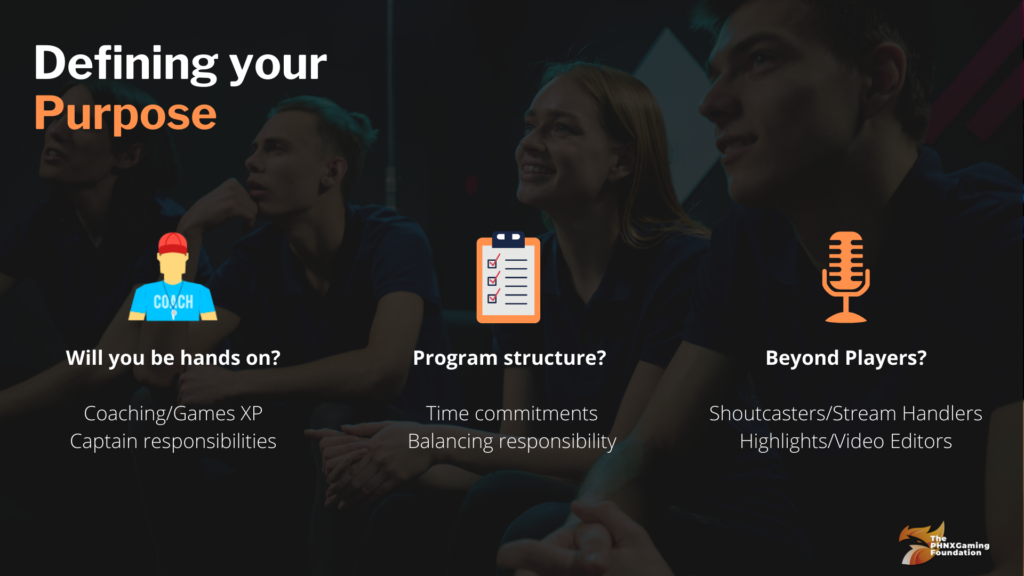What kind of coach will you be?
We all come from different backgrounds – some of us have little to no experience in traditional athletics but are familiar with some or all of the major esports titles; others have extensive knowledge of traditional sports but little understanding of games students compete in; and there are others who have little experience in both. All three of those people can still become great coaches. Coaching is like teaching (if you aren’t a teacher, that’s fine!). Your number one goal is to create a safe environment for students to explore a passion and work to get better at that passion.
That philosophy doesn’t care if you are playing football, soccer, rocket league, or chess. It all starts with a good foundation. So, let’s start yours.

The basic definition of a team is, “a group of players forming one side in a competitive game or sport.” That’s where you come in. Your overall goal is to differentiate these athletes from a club.
Question one: “What kind of coach am I going to be?”
Will you be hands on? teaching concepts and skills directly from your own game knowledge?
Will you be more of a manager? leaning on your high ranking players to teach while you maintain the programs’ structure and schedules?
What will your Goals/Norms/Slogans be?
How will you handle toxicity? Do you have a sportsmanship pledge?
The ideal coach is one that combines these two, but the reality is this: these kids are good. And even the brand new kids can become great. Very fast. HOWEVER – the one thing you can provide that solo-q and casual gaming can’t is structure. From my own experience, I can tell you that there are incredibly talented kids who are great on their own or in solo-q, but falter on a team. Teams require trust, communication, and respect. Yes, championships are awesome, but as a scholastic coach your primary goal is often to leave a lasting impression and create good kids who became great adults – the sport is just the conduit for that growth. (Fun fact, when you focus on general human qualities, they become better players too). So – take a moment to think about what type of coach you can be, and what kind of coach you want to be, this will help you as you design your program’s structure.
Core elements of team’s foundation.
What will your Goals/Norms/Slogans be?
How will you handle toxicity? Do you have a sportsmanship pledge?
Watch my story
I knew nothing about League of Legends when the beta season of Georgia Varsity esports were first announced. But, I had a month to prepare and I thought grinding and researching the game was all I needed to do to be ready for our first practice. Did it help? Yes – the research for sure, understanding the base concepts, yet. But, when I learned that our top 5 player’s ranks were Platinum, Gold, and Silver, I quickly realized I was complete outmatched by the players on game knowledge and skill. I couldn’t be a coach in that sense and was naïve to think so – they had years on me.
So, I did the best I could with what I had: I leaned on my experts. The high level players became captains and assisted in training the new players. And at first, I held a very “managerial” roll: keeping track of our roster, gameday, communication with parents, ordering pizza.
Fall Season 0, the test went as best it could. But I realized that while we were having fun, the kids were enjoying it all. We weren’t a team. We were a club. Slightly disorganized with a lot of potential. Between Fall and Spring seasons I realized some things needed to change. I recognized a few elements that I could control.
